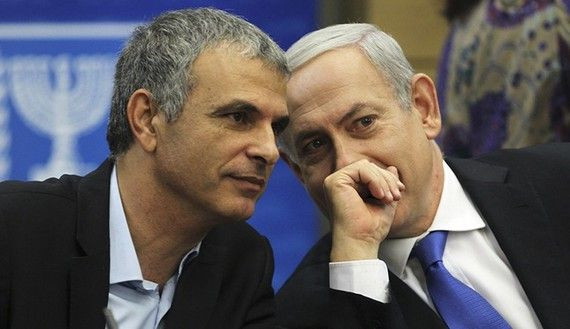Israel Elections 2015 Moshe Kahlon: Kulanu Party Leader Holds The Cards In Netanyahu's Future

Israeli Prime Minister Benjamin Netanyahu’s Likud party comfortably defeated the Zionist Union opposition in Tuesday's national elections with a total of 30 votes. But with a coalition needed to reach the 61-seat majority, ex-Likud member and leader of the brand-new Kulanu party, Moshe Kahlon, seemingly holds all the power.
Netanyahu must form the coalition to stay in power, and the centrist Kulanu party could take its 10 seats to either right-wing Likud or the center-left opposition, which puts Kahlon in a position to be a kingmaker. Kahlon, the son of Libyan immigrants, defines himself as slightly to the right of center, which means he could tip the scales of the Likud-led Knesset.
On Sunday, Netanyahu offered Kahlon the role of finance minister if he joined a Likud party-led governing coalition. Kahlon, 54, would replace Yair Lapid, who Netanyahu dismissed prior to calling the snap elections. A Kulanu spokesman said negotiations on a political partnership had yet to begin, Reuters reported.
Kahlon called Netanyahu’s offer “flattering” and said he would not rule out joining with Netanyahu or Zionist Union leader Isaac Herzog. Herzog praised Kahlon’s economic proposals and said he would be happy to implement the reforms with Kahlon in his government. Herzog, however, has not offered Kahlon the finance post, the Jerusalem Post reported.
Kahlon was first elected to Israel’s parliament, or Knesset, in 2003. Netanyahu appointed him communications minister after winning the 2009 elections, and later offered Kahlon a second ministerial portfolio -- welfare and social services -- in 2011, according to the Middle East Monitor.
Kahlon was considered to be among the most popular politicians in the ruling Likud party. He became known for breaking Israel’s mobile phone monopoly and slashing costs for consumers, according to the Times of Israel. Despite calls from Netanyahu and fellow Likud members to stay, Kahlon announced his resignation in October 2012. He didn't elaborate on reasons for taking "a break" from politics, but said he would continue to support the right-wing party.
“I am leaving the Knesset, not Likud,” he said, according to the Times of Israel. “I was always a part of you, and I will continue to be a part of you. You were part of me, and you shall remain so.”
Shortly before Netanyahu announced early elections, Kahlon stepped in with his own brand-new party last November with his eye on the finance ministry. Kahlon established the center-right Kulanu party, which means “All of Us” in Hebrew, i23news in Tel Aviv reported.
While Netanyu promised Israeli voters security and spending initiatives on the campaign trail, Kahlon’s campaign focused on the economy, the monopolistic banking industry and cutting the high cost of living -- policies which analysts said would keep inflation and interest rates low, but could also clash with Likud’s hard-right views if he were to join Netanyahu.
“[Kahlon’s] tenure as the finance minister will not be easy, as part of his socioeconomic platform is contrary to the capitalist world views of the right-wing parties led by the Likud,” Modi Shafrir, chief strategist of Mizrahi-Tefahot Bank’s finance division, told Reuters Wednesday.
The Kulanu party also vowed to “keep a united Jerusalem as the capital of Israel along with the main blocks of settlement, and not allow the return of Palestinian refugees to Israel,” and to “assist the Palestinian Authority in their management and development of a prosperous Palestinian life in the West Bank,” according to the Middle East Monitor.
Netanyahu initially announced his support for Palestinian statehood in 2009, after U.S. President Barack Obama was elected into office. Earlier this year, the Palestinians joined the International Criminal Court to pursue war crimes charges against Israel. Netanyahu reversed his commitment to a Palestinian statehood on the eve of Israel’s general election, saying he would never endorse a two-state solution to the Israeli-Palestinian conflict if he resumed office, which deepened a rift with the Obama administration, the New York Times reported.
Netanyahu has also been a fierce critic of Obama’s nuclear talks with Iran. But the Kulanu party said the Israeli government has the “right and duty to defend itself against any existential threat,” but it “should maintain a close relationship with countries that are negotiation partners and support sanctions,” according to the party’s platform.
© Copyright IBTimes 2025. All rights reserved.





















